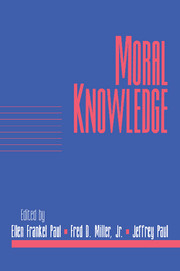Book contents
- Frontmatter
- Contents
- Introduction
- Acknowledgments
- Contributors
- Realist-Expressivism: A Neglected Option for Moral Realism
- Thinking about Cases
- But I Could Be Wrong
- Moral Facts and Best Explanations
- Two Sources of Morality
- “Because I Want It”
- Realism, Naturalism, and Moral Semantics
- Incomplete Routes to Moral Objectivity: Four Variants of Naturalism
- Explanation, Internalism, and Reasons for Action
- Moral Knowledge as Practical Knowledge
- Practical Reason and Moral Psychology in Aristotle and Kant
- Hypothetical Consent in Kantian Constructivism
- Mill's “Proof” of the Principle of Utility: A More than Half-Hearted Defense
- Index
Realism, Naturalism, and Moral Semantics
Published online by Cambridge University Press: 04 August 2010
- Frontmatter
- Contents
- Introduction
- Acknowledgments
- Contributors
- Realist-Expressivism: A Neglected Option for Moral Realism
- Thinking about Cases
- But I Could Be Wrong
- Moral Facts and Best Explanations
- Two Sources of Morality
- “Because I Want It”
- Realism, Naturalism, and Moral Semantics
- Incomplete Routes to Moral Objectivity: Four Variants of Naturalism
- Explanation, Internalism, and Reasons for Action
- Moral Knowledge as Practical Knowledge
- Practical Reason and Moral Psychology in Aristotle and Kant
- Hypothetical Consent in Kantian Constructivism
- Mill's “Proof” of the Principle of Utility: A More than Half-Hearted Defense
- Index
Summary
INTRODUCTION
The prospects for moral realism and ethical naturalism have been important parts of recent debates within metaethics. As a first approximation, moral realism is the claim that there are facts or truths about moral matters that are objective in the sense that they obtain independently of the moral beliefs or attitudes of appraisers. Ethical naturalism is the claim that moral properties of people, actions, and institutions are natural, rather than occult or supernatural, features of the world. Though these metaethical debates remain unsettled, several people, myself included, have tried to defend the plausibility of both moral realism and ethical naturalism. I, among others, have appealed to recent work in the philosophy of language–in particular, to so-called theories of “direct reference” – to defend ethical naturalism against a variety of semantic worries, including G. E. Moore's “open question argument.” In response to these arguments, critics have expressed doubts about the compatibility of moral realism and direct reference. In this essay, I explain these doubts, and then sketch the beginnings of an answer–but understanding both the doubts and my answer requires some intellectual background.
In Principia Ethica, G. E. Moore used the open question argument (OQA) to deny that moral properties, such as Tightness or goodness, are natural or metaphysical (that is, supernatural) properties. Moral properties, on his view, are nonnatural and sui generis. The OQA attempts to establish this ontological or metaphysical thesis by semantic means. The OQA assumes that if moral properties are natural properties, then moral predicates can be defined in terms of natural predicates, which Moore apparently understood as nonmoral predicates drawn from the natural and social sciences (broadly construed).
- Type
- Chapter
- Information
- Moral Knowledge , pp. 154 - 176Publisher: Cambridge University PressPrint publication year: 2001
- 6
- Cited by



